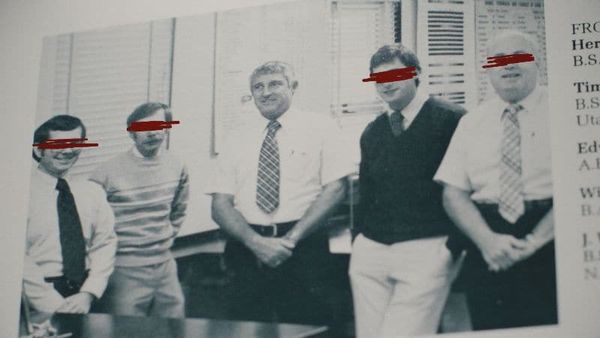Eye For Film >> Movies >> What Haunts Us (2016) Film Review
What Haunts Us
Reviewed by: Jennie Kermode

In recent years there have been quite a number of films, both documentary and fiction, about the exposure of institutional child abuse. What most of them have in common is that they conclude with the public unmasking and sentencing of the abusers. There will occasionally be reference to how survivors are doing in the present, or to the suicides of some of those involved, but otherwise the case is closed. Should it be? When we take this approach, cinematically and culturally, to such cases, are we leaving important questions unasked?
Paige Tolmach was a member of the 1979 class of Porter Gaud School in Charleston, South Carolina. Over the years after finishing there she vaguely kept in touch with some of her former classmates and noticed when their names came up in the press. She heard about the scandal around teacher Eddie Fisher when it finally broke, and it startled her; she felt guilty for not having realised at the time that several of her classmates were being abused by him. But it was only later, when she realised just how many people from her class had since died by suicide, that she began to think about what had happened in a larger context. To the victims, Fisher himself was only part of a much bigger problem.
What emerges in Tolmach's documentary is shocking but, on another level, unsurprising. There are two strands to it. Firstly, she looks at the long term impact of the abuse and the different ways that different victims reacted to it. Secondly, she looks at the cover-up, the way that much of what went on happened in plain sight, and meets the survivor who, in due course, fought to have those who let Fisher stay in teaching brought to justice.
The variety of victims' experiences over the years may come as a surprise to some viewers, and has the potential to reassure those who have been through abuse themselves and worried that their reactions are not the right ones, the socially approved ones. One man talks about his struggle with the fact that he didn't mind what was happening at the time - it was only later, as a mature adult himself, that he understood how he had been exploited. Any pretence that these occurrences were acts of affection, or that Fisher cared about the boys, is undermined by the sheer number of those he targeted and the forgetful way he discusses them in the recorded testimony included in the film. He doesn't show much awareness of them as people with thoughts and experiences of their own, or any interest in discerning that.
The stereotypical child molestors, the creepy ones, are caught right away, Tolmach notes. But Eddie Fisher was warm and charming. He was particularly good at befriending people in positions of influence. Some of the victims talk about how they tried to raise the issue of his behaviour but were simply ignored. One family took it up with the school and were told that the situation would immediately be dealt with, but nothing happened. Why? And should Fisher's superiors, who were made aware of his crimes but failed to act, be criminally liable as a result?
The Fisher case is, of course, the tip of the iceberg. Many similar cases have been identified, something that Tolmach makes a point of at the end of the film. In many communities, abuse simply isn't taken very seriously, or those who are happy to rail about it in the abstract tune it out when it's committed by someone they like. Tolmach and several of her former classmates discuss their own feeling that they should have understood the situation better, that they should have done something, but quite what they could have been expected to do at that age, when adults didn't seem to care, is difficult to determine. There is important stuff here about why very few children speak up when they're being abused, and about how options that seem obvious to adults are invisible to them.
The message that we all need to take responsibility for keeping children safe is a provocative one, so it's easy to see why it's rarely addressed. This is no simple tale of heroes and villains, the way most discussions of child abuse are framed. It's Tolmach's first film and a more assured hand might have given it more impact, but it's a brave effort and an important contribution to this area of cinema.
Reviewed on: 27 Jul 2018















